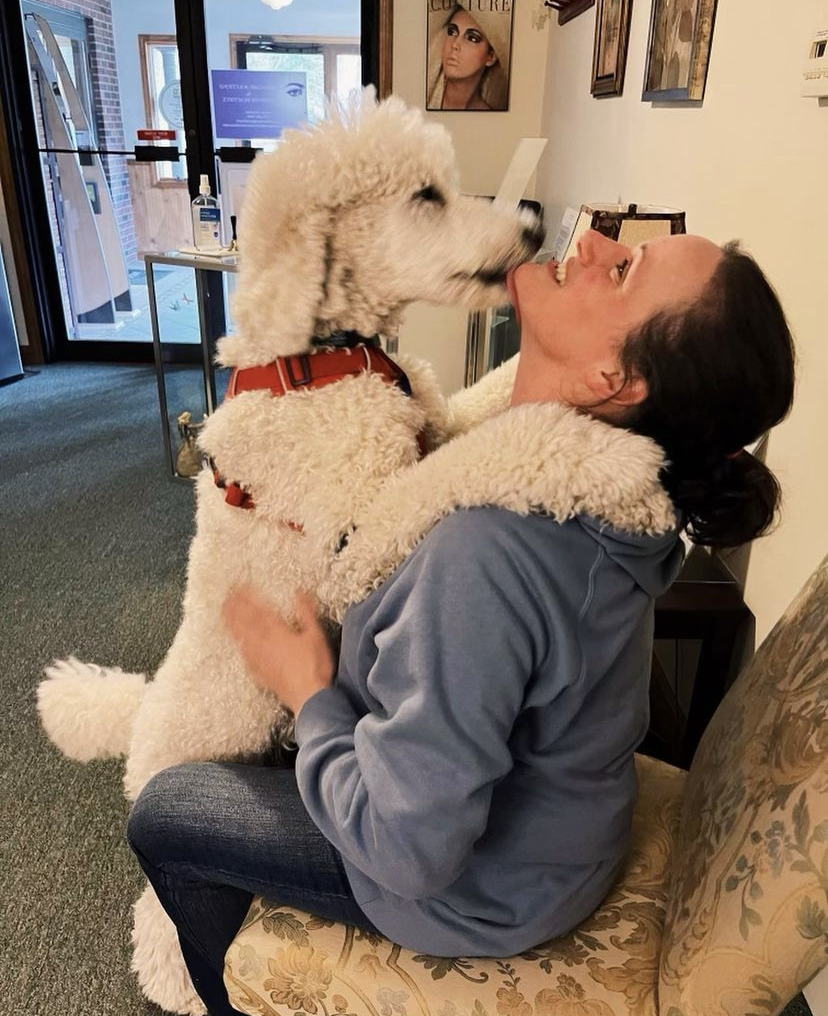Fear Free Grooming Part One – Prevention Through Socialization
Shannon Duggan – Owner & Head Groomer
Four Paws Only, Dracut, MA
I would like to talk about what Fear Free Grooming is and how we can better obtain that experience for our pets. How can we set our dogs up for the best possible outcome? The term ‘Fear Free’ can mean different things to different people. Interpretation is everything. My explanation would be the least amount of discomfort emotionally, physically and mentally experienced by a pet. I could also extend that same benefit to the animal caretaker. Fear Free can be achieved in two forms, prevention (proper introduction, meet and greets, regular grooming) and through recovery (repairing how a pet feels about the experience from trauma, lack of experience or special accommodations due to the innate temperament of some breeds).
There are times when I see owners struggle more than their pets when leaving them for grooming. Sometimes, they’ve had a bad experience prior. Other times, they’ve had no experience and do not know what to expect when dropping their dog off at a brand-new facility, full of strangers. I sit back and think about how that might feel, as I am my dogs’ primary caretaker. As their mom and groomer, the only time I ever entrust them to another human is during vet care. Otherwise, I’m always in their presence. So, I certainly do not take for granted the amount of trust that is put into me, my staff and in my facility when people do choose to trust us with their loved one.
There are many steps to what is put into a groom. Safety is always our top priority. Next, is comfort, creating a positive experience. Then there is an aesthetic piece of course. That is very important, we certainly want the dogs leaving our facility looking their best. In order for that to happen, we need proper conditions and good behavior to be successful. That being said, how can we set our dogs up for success?
Puppies undergo a critical socialization period from 6 to 16 weeks of age, which significantly impacts their lifelong behavior. During this period, their brains are like tiny sponges – soaking up everything they experience and filing it away for the future. It’s worth noting that some experts believe the socialization period can end as early as 12 weeks! Beyond this time frame, something happens. Our puppies enter a fear period. New things, which before were accepted with cheerful curiosity and a wagging tail, are now met with suspicion. Anything that the pup has not already encountered is automatically assumed to be dangerous. You may have met adult dogs who are fearful of everyday objects or unfamiliar people. In many cases, this is the end result of poor socialization during this all-important period. This is actually a pretty staggering fact – nothing “bad” has to happen at all. A simple lack of exposure at the right time can result in an adult dog who is unable to cope with normal life.
So when should you start actively socializing your puppy? Right now. As soon as possible. From the very first day your new pup comes home, the clock is ticking.
In order for us to lock in a great experience during puppies’ early socialization phases, we offer something we call a Meet Greet and Treat Session. It’s exactly how it sounds. We schedule a time for the dog and owner to come in for us to meet them both, greet them and treat them. This session does not include any grooming or handling. We generally do not take the pet out of view of the owner for a couple of reasons. One, we want the owner to be comfortable but most importantly want the pet to be comfortable. These sessions are ideal for brand-new baby puppies but also benefit new clients, dogs that have never had a grooming experience and adult dogs that have had bad experiences. They may have fear towards new experiences, new people, the general grooming experience or even a nail trim. But you can read more about this in Part Two.
I would like to introduce you to my friend Jenny and her dog Reina. A wonderful example of what early socialization and positive reinforcement can do! At the moment, Reina is a one-year old Standard Poodle puppy. I have known Reina since she was about 13 weeks old. Jenny is a dog trainer. She also has a background with previous dogs that had struggled with fear and anxiety. Therefore, Jenny has a lot of experience, knowledge and compassion for Fear Free experiences all around. She decided to bring a puppy into her home about a year ago. She had done her research, chose a breeder and Reina joined their family!

The Zen Grooming: Shannon Duggan, Featured With Standard Poodle Reina

Hiya, I’m really glad I’ve found this info. Nowadays bloggers publish just about gossips and web and this is really annoying. A good web site with exciting content, that’s what I need. Thank you for keeping this web-site, I’ll be visiting it. Do you do newsletters? Can’t find it.
Greetings from Colorado! I’m bored to tears at work so I decided to check out your website on my iphone during lunch break. I love the information you provide here and can’t wait to take a look when I get home. I’m amazed at how fast your blog loaded on my mobile .. I’m not even using WIFI, just 3G .. Anyhow, very good site!
Definitely one of the best explanations out there.
Very well explained
Having gone through a similar experience myself, I found your insights particularly validating. You captured emotions I struggled to articulate, which made me feel less alone in my journey. Thank you for sharing something so personal.
My Page – I didn’t expect to find such helpful content. Thanks a lot!
View Blog – You make learning fun and easy.